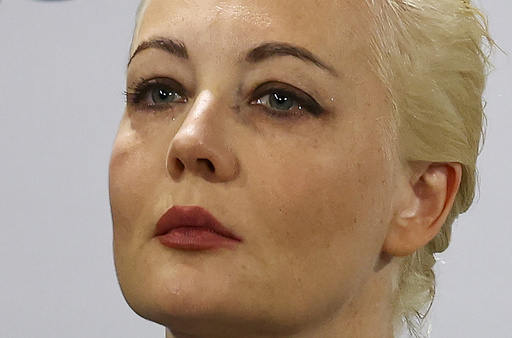Associates of Russian opposition leader Alexei Navalny said Monday that talks were underway shortly before his death to exchange him for a Russian imprisoned in Germany.
“Alexei Navalny could have been sitting here now, today. It’s not a figure of speech,” Maria Pevchikh, a close associate who lives outside Russia, said in a video statement posted on social media. She said she received confirmation the talks were in the “final stages” on Feb. 15, the day before Navalny was reported dead.
Her claims, which were reiterated on social media by other Navalny aides, could not be independently confirmed and she did not offer any evidence to back them up.
According to Pevchikh, Navalny and two U.S. citizens held in Russia were supposed to be swapped for Vadim Krasikov. He was serving a life sentence in Germany for the 2019 killing in Berlin of Zelimkhan “Tornike” Khangoshvili, a 40-year-old Georgian citizen of Chechen descent. German judges said Krasikov acted on the orders of Russian authorities, who gave him a false identity, passport and resources to carry out the killing.
She didn’t identify the U.S. citizens that were supposedly part of the deal. There are several in custody in Russia, including Wall Street Journal reporter Evan Gershkovich arrested on espionage charges, and Paul Whelan, a corporate security executive from Michigan, convicted of espionage and serving a long prison sentence. They and the U.S. government dispute the charges against them.
German officials have refused to comment when asked if there had been any effort by Russia to secure a swap of Krasikov.
U.S. commentator Tucker Carlson earlier this month asked President Vladimir Putin about the prospects of exchanging Gershkovich, and Putin said the Kremlin was open to negotiations. He pointed to a man imprisoned in a “U.S.-allied country” for “liquidating a bandit” who had allegedly killed Russian soldiers during separatist fighting in Chechnya. Putin didn’t mention names but appeared to refer to Krasikov.
Pevchikh alleged in her video, without offering evidence, that Putin “wouldn’t tolerate” setting Navalny free and decided to “get rid of the bargaining chip.”
Asked at a regular news conference in Berlin about the claim by the Navalny team, German government spokesperson Christiane Hoffmann said she couldn’t comment.
Tatiana Stanovaya of the Carnegie Russia Eurasia Center said on Telegram that Putin, “fundamentally, always makes exchanges according to the one-for-one formula” and may have been ready to swap “Krasikov for journalist Evan Gershkovich.”
A Western government official with knowledge of the situation who insisted on anonymity said no offer involving Navalny and U.S. citizens was made.
Sergey Radchenko, a professor at Johns Hopkins’ School of Advanced International Studies, said he was skeptical that Putin would agree to exchange Navalny and then “murder him at the last moment to avoid this exchange.”
Navalny, 47, Russia’s best-known opposition politician, died Feb. 16 in an Arctic penal colony while serving a 19-year sentence on extremism charges that he rejected as politically motivated.
Navalny had been jailed since January 2021, when he returned to Moscow of his own accord after recuperating in Germany from nerve agent poisoning he blamed on the Kremlin. He was later handed three prison sentences on charges he rejected as politically motivated.
His family spent a week fighting with the authorities, who reportedly insisted on a secret funeral, before his body was returned to them. Prominent Russians released videos calling on authorities to release the body. Western nations have hit Russia with more sanctions in response to Navalny’s death as well as for the invasion of Ukraine, which marked its second anniversary on Saturday.
Navalny’s spokeswoman Kira Yarmysh said Monday they were looking for a venue for a memorial service later this week.
___
Associated Press journalists Geir Moulson in Berlin, Joshua Boak in Washington and Elise Morton in London contributed to this report.
Home Politics Live Politics Navalny aides say the Russian opposition leader was close to being freed...
